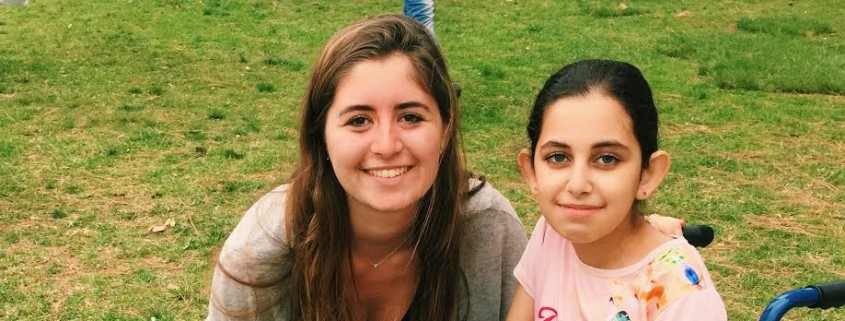USC students embrace relocated Syrian refugees
When Lida Dianti turned on the news and saw Syrian children losing their homes, their families and their very lives, she wanted to help in a sustainable way. Her purpose became to give young Syrians something that could never be taken away from them: education.
Dianti founded the USC chapter of Students Organize for Syria in Fall 2016. The organization tutors students in English as part of their Students Teach for Syria program and co-hosts donation drives with UCLA to support families in El Cajon, a city near San Diego.
The Syrian Civil War is currently in its sixth year, and millions have been displaced from their homes. Three years ago, the United Nations called the Syrian Civil War “the biggest humanitarian crisis of our era.” Because of the prevalence of information about the war, Dianti is adamant that the purpose of her club is not to raise awareness.
“People know,” she said. “It’s 2017; we all have iPhones. People are well aware of what’s going on. I’m done having dialogue. I’m done raising awareness. I want action.”
Action is an understatement for Dianti’s role in the club. She spends all her free time on SOS, whether she’s picking up lunch ingredients for the kids, brainstorming ideas for new projects or driving down to El Cajon to help out — a trip she makes every weekend. The dozen or so families she works with in El Cajon know and expect her; they have her number, they know her name and they know her car.
The focus of Dianti’s club is education as she believes it is crucial for refugee children to continue their studies. As a senior majoring in international relations, she had been closely following the conflict. Over a year ago, she began tutoring a Syrian student, someone she still considers a very close friend. After meeting her, Dianti had a personal stake in the war.
“She changed my whole life,” Dianti said.
Dianti wanted to start a tutoring program here on campus because of the high demand for English speaking tutors.
In her experience, there are a variety of reasons Syrian children want English tutors. Primarily, students want to be prepared for placement exams so they can get into universities and make a life for themselves outside of their unstable country. Students also need English assistance to fill out applications for jobs, for asylum and for colleges. A third group simply wants to practice their speaking.
“[When studying a foreign language], it’s very common that reading and writing is easy, but speaking, that can only come from experience and practice,” Dianti said. “The best way to do that is with a native speaker.”
Sofia Deak, vice president of SOS, first got involved as a tutor.
“I had been looking for a way to help out with the crisis going on in Syria and have a lasting impact on the people who were suffering there,” she said.
Deak then helped expand SOS’ work to El Cajon and coordinated volunteers for their donation drives, and has had memorable interactions with refugees on each trip. Families invited her in for Arabic tea or coffee (which Dianti raves about), and one family even insisted Deak stay for dinner. Kids hugged and kissed her after receiving gifts, and one man cried of joy after the volunteers bought glasses for him after he was unable to fill his prescription.
“He was grateful for something that we thought was small,” Deak said.
Deak has been studying Arabic for two years, but knowledge of Arabic is by no means a requirement for tutors or volunteers, given the high demand.
“My Arabic is so bad, but they just want to hang out with you,” Dianti said of her frequent trips to El Cajon.
She visits nine to 15 families each week and has gotten to know each family well. On Jan. 6, she took a young boy to In-N-Out, and they were laughing and eating together despite the language barrier. She would try to speak Arabic, and he wouldn’t understand. The boy would speak English, and she would get confused, but they would both learn a little as they laughed a lot.
“It’s genuinely fun,” she said. “It’s like hanging out with family. They need compassion. They need to be treated like human beings because that hasn’t happened to them in a very long time.”
Dianti graduates this year, but she still has new plans for SOS in the works. Her latest is a program that allows USC students to improve their colloquial Arabic skills and allows refugees to earn some money. Students can study Arabic in school, but she feels that it’s focused on reading and writing formally, not conversing casually. Ideally, USC students could have Skype Arabic lessons from, for example, a Syrian mother with young children who can’t leave the house to work, and pay them $15 to $20 an hour. It’s essentially the inverse of the English tutoring program they have in place, but unlike the English program, there isn’t a huge demand for tutors.
According to Dianti, the hardest part of working with refugees is making promises that are difficult to keep. She said the executive board has no shortage of passion and enthusiasm, but there is a shortage of volunteers, forcing the few dedicated members to overextend themselves and work long hours to ensure they don’t let the refugees down. And yet, they keep doing it, over and over.
“It’s the best thing I’ve done with my life, honest to God,” she said. “They just want people to hang out with, they want to meet Americans, they want to practice English, they want to feel like they’re a part of the community.”

